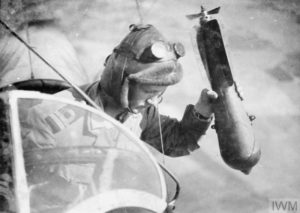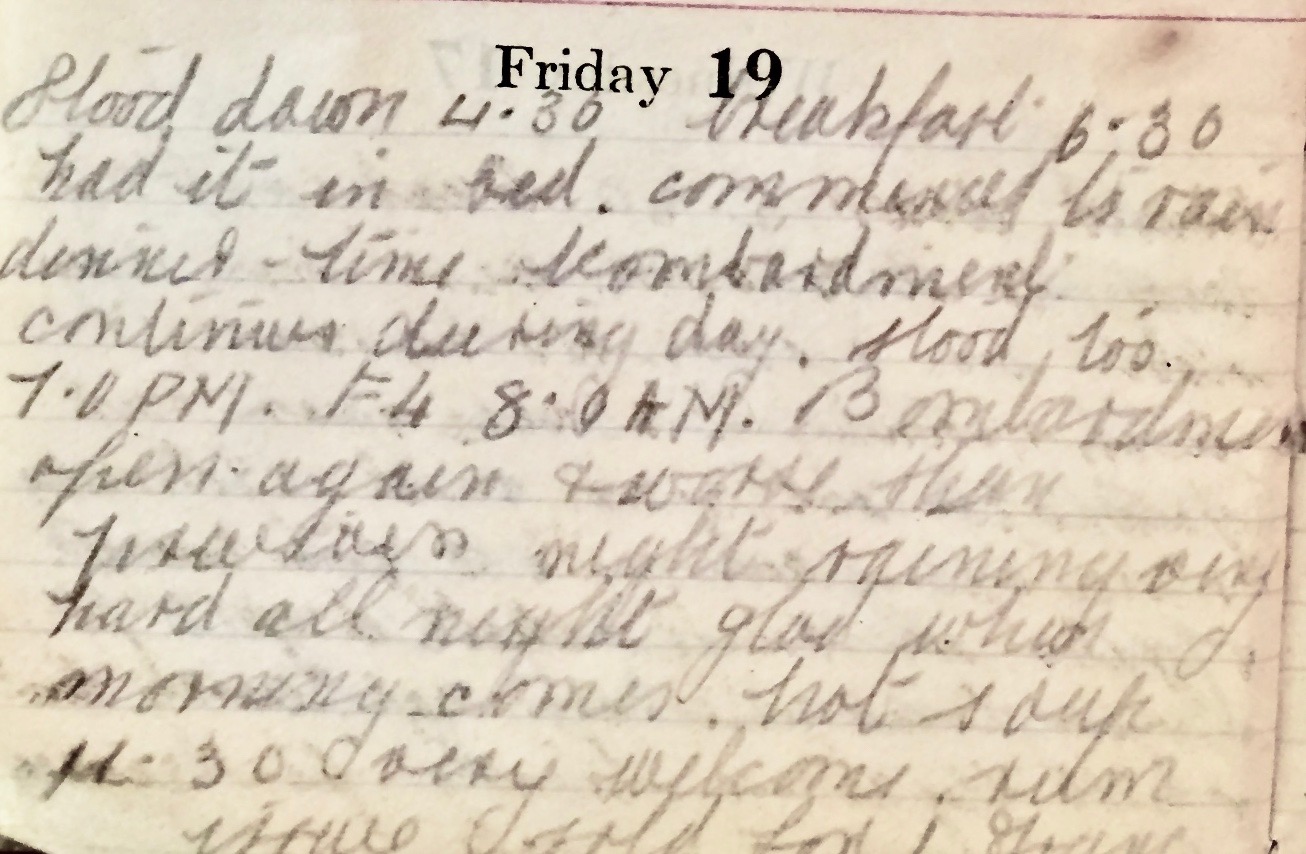Friday April 19th, 1918
Stood down 4:30, breakfast 6:30 – had it in bed. Commenced to rain dinner time. Bombardment continues during day. Stood to 7pm #4 to 8am. Bombardment opens again and worse than yesterday night. Raining very hard all night. Glad when morning comes. Hot soup at 3 very welcome. Rum issue sold for 1 Franc.
Bombardment Continues
According to the BWD entry yesterday, the artillery bombardment is based to the left of the 13th, in Numbers 1, 2 and 3 Sectors. They are attempting to cut wire, harass the enemy and counter battery work. We are now in day two of the five day assault.
Lewis Gun & Rum
Frank is still doing night shift on the Lewis Gun position #4. It appears he might have been ‘promoted’ to a machine gun crew – possibly because the HQ Lewis Gun team has just been drawn from across the Battalion and may have created vacancies. He enjoyed the hot soup, but still sold his rum issue. Presumably, as a teetotaler, Frank would not have been tempted by the ‘demon drink’, but many felt the rum ration was vital for morale.
Captain Alexander Stewart wrote, ‘The finest thing that ever happened in the trenches was the rum ration, and never was it more needed than on the Somme;’ He then had quite a diatribe against a General who had stopped its issue. ‘Those who have not spent a night standing, sitting or lying in mud with an east wind blowing and temperature below freezing point may consider I am extravagant in my abuse of the men who denied the soldier his rum ration.’¹ He clearly did not.
Enemy Aeroplanes

The Battalion Diary avidly reports the movement of aeroplanes, particularly noting if any from the enemy come over the British lines. Captain Stewart provides a reason for this, ‘Judging from personal experience it appears obvious that the success of an army in the field primarily depends on the initiative in the air being obtained and maintained. Nearly every time that an enemy aeroplane was permitted to fly over or behind our outpost line, and to return to its own lines in safety, both our infantry and artillery shortly afterwards sufferers from severe and accurate shell fire.’ ²
There is obviously another reason: that aeroplanes (and airships) dropped bombs. This photograph shows a crew member of an SS ‘Z’ Class airship about to throw a bomb from the rear cockpit of the gondola.* Over the course of the war, such operations became a little more sophisticated. See this post for video footage.
Today, there is particular paranoia as it appears the Bulgars may have managed to get hold of an Allied plane and therefore may cross the lines unremarked. As a consequence, Allied planes each fly distinguishing streamers.
13th (Service) Battalion War Diary – 19th April 1918 – Crow Hill
At 02:15 hrs 6 bombs and 5 minutes rapid rifle fire were heard east of Kimberley Spur. This could not be accounted for as we had no patrols out at the time nor had the 8th KSLI in No 3 Sector. From 05:00 to 06:30 hrs smoke was seen issuing behind Spotted Dog. The day was not a good one for observation, our artillery registered only. Enemy artillery was inactive in the sector. In the afternoon rain commenced falling and continued throughout the night. At 20:15 course a green light was fired from the west of P3 and rifle fire was hear, but it was not possible to tell if there was any connection between the two.
Our planes, working in pairs, remained up reconnoitering in pairs all morning but there was no sign of any enemy aircraft. Our planes are all flying streamers from their vertical rudders as it is believed the enemy are using one of our planes with our markings, which they have captured for reconnaissance over our lines. Work has been noticed on Devedzelli Spur and on forward slope of Flat Iron Hill. Parties working under RE now work from 07:00 to 11:00 hrs. The artillery activity mentioned yesterday on our right was very strong on both sides during the night.
References & Further Reading
¹ ‘A Very Unimportant Officer’ by Alexander Stewart, Captain & Cameron Stewart, 2008, Kindle Locn 834
² As above, Kindle Locn 254
* Q67695 copyright Imperial War Museums


